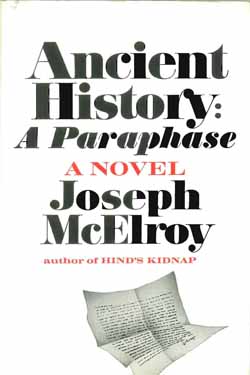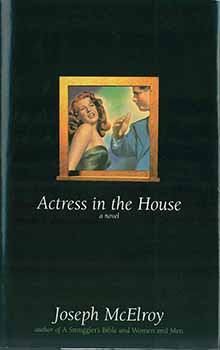A cannonball is round shot ammunition for a cannon.
Joseph Prince McElroy is an American novelist, short story writer, and essayist. He is noted for his long postmodern novels such as Women and Men.
Ken Rex McElroy was an American criminal and convicted attempted murderer who resided in Skidmore, Missouri, United States. He was known as "the town bully", and his unsolved killing became the focus of international attention. Over the course of his life, McElroy was accused of dozens of felonies, including assault, child molestation, statutory rape, arson, animal cruelty, hog and cattle rustling, and burglary.
John Chatterton is an American wreck diver. Together with Richie Kohler, he was one of the co-hosts for the History Channel’s Deep Sea Detectives, for 57 episodes of the series. He is also a consultant to the film and television industries and has worked with 20th Century Fox, Paramount Pictures, and CBS.

Lieutenant-Commander Lionel Kenneth Phillip Crabb,, known as Buster Crabb, was a Royal Navy frogman and diver who vanished during a reconnaissance mission for MI6 around a Soviet cruiser berthed at Portsmouth Dockyard in 1956.
Gary Gentile is an American author and pioneering technical diver.
Samir Alhafith is an Australian technical diver, cave explorer and underwater filmmaker. He is the founder and team leader of the Sydney Project - an association of technical divers involved in researching and discovering important historical wrecks in depths between 75 and 135 metres on the south coast New South Wales.

Maurice Fargues was a diver with the French Navy and a close associate of commander Philippe Tailliez and deputy commander Jacques Cousteau. In August 1946, Fargues saved the lives of Cousteau and Frédéric Dumas during their dive into the Fountain of Vaucluse. On September 17, 1947, while attempting to set a new depth record, Maurice Fargues became the first diver to die using an aqualung.
Joseph Beverly MacInnis D.Sc. is a Canadian physician, author, and diver. In 1974, MacInnis was the first scientist to dive in the near-freezing waters beneath the North Pole. In 1976 he became a member of the Order of Canada.

Ancient History: A Paraphase is Joseph McElroy's third novel, published in 1971. It presents itself as a hastily written essay/memoir/confession. The character Dom is sometimes described as a fictionalized Norman Mailer.

Women and Men is Joseph McElroy's sixth novel. Published in 1987, it is 1192 pages long. Somewhat notably, because of its size, the uncorrected proof was issued in two volumes.

Lookout Cartridge is Joseph McElroy's fourth novel, published by Knopf in 1974.

Plus is Joseph McElroy's fifth novel. Set in some unspecified future, it tells the story of Imp Plus, a disembodied brain controlling IMP, the Interplanetary Monitoring Platform, in earth orbit. The novel consists of Imp Plus's thoughts as he tries to comprehend his limited existence, while struggling with language, limited memories, and communicating with Ground Control. The plot is driven by Imp Plus's recall of fragments of his past and of language, his improving comprehension of his present, all while his medical condition gradually deteriorates.

A Smuggler's Bible is Joseph McElroy's first novel. David Brooke—who talks of himself in a split-personality manner—narrates a framing tale that consists of him "smuggling" his essence into eight autobiographical manuscripts, although their connection with Brooke is not always clear. Brooke seems to deteriorate, while his fictions become more real.

The Letter Left to Me is Joseph McElroy's seventh novel. A letter from father to son is delivered to the son shortly after the father's death. The letter receives wider and wider circulation, and its continued effect on the son's life is described.

Actress in the House is Joseph McElroy's eighth novel. Lawyer Bill Daley follows up an unusual phone call from stage actress Becca Lang by attending her show. Daley is appalled when Becca is slugged rather brutally in what was clearly supposed to have been a stage slap. He stays afterwards, and she moves into his life.

May We Be Forgiven is a 2012 novel by American writer A. M. Homes. It won the 2013 Baileys Women's Prize for Fiction.
Sergio de la Pava is an American novelist and lawyer. He is best known for his novel A Naked Singularity.

Richard William Stanton, is a British civilian cave diver who specialises in rescues through the Cave Rescue Organisation and the British Cave Rescue Council. He has been called "one of the world's most accomplished cave-divers", "the face of British cave diving," and "the best cave diver in Europe". Stanton has lived in Coventry for many years, and was formerly a firefighter with the West Midlands Fire Service for 25 years prior to his retirement. In 2018 he played a leading role in the Tham Luang cave rescue and was awarded the George Medal in the Civilian Gallantry List.

Thomas "Tommy" Burns was a British diver born in Liverpool, England. Throughout the late 19th century, he gained notoriety for diving off structures, usually bridges such as London Bridge and Clifton Suspension Bridge in England and the Tay Bridge in Scotland. Often, his diving attempts would be thwarted by police or he would face arrest upon returning to dry land. Burns was also known to be a life saver and during his lifetime, is believed to have saved in excess of 40 lives.












